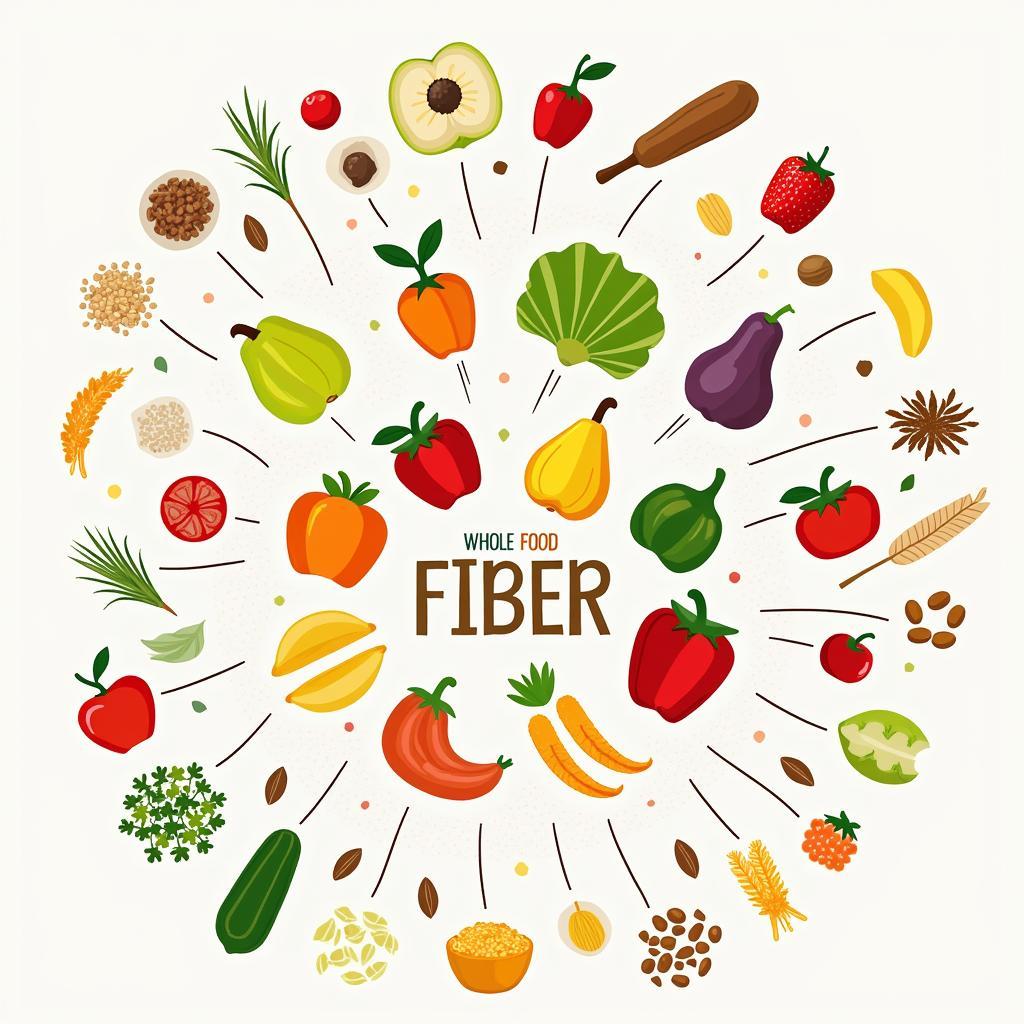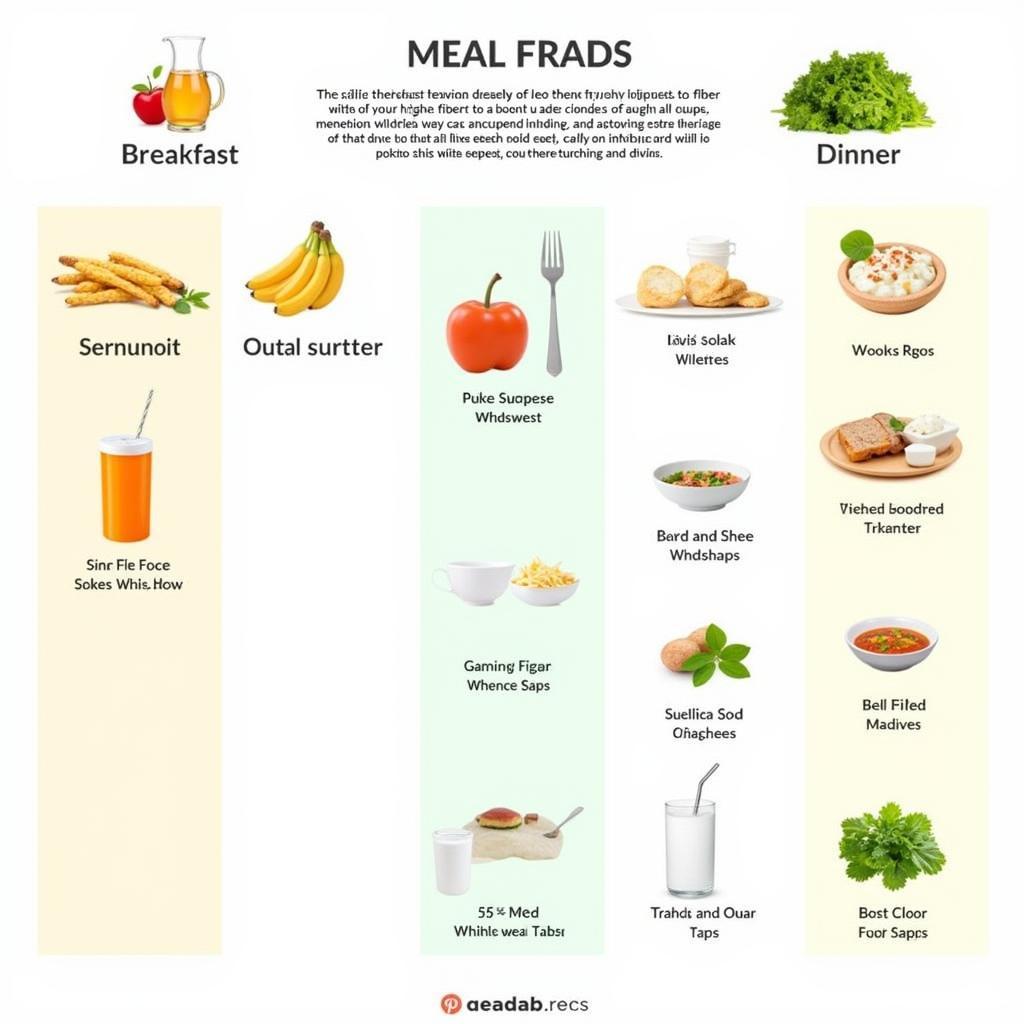Whole Food Fiber is a cornerstone of a healthy diet, offering a plethora of benefits that extend far beyond regular digestion. From boosting gut health to managing weight and even reducing the risk of chronic diseases, understanding the power of whole food fiber is crucial for anyone striving for optimal well-being. Let’s delve into the world of this dietary superhero and uncover why it deserves a prominent place on your plate.  Benefits of Whole Food Fiber
Benefits of Whole Food Fiber
What is Whole Food Fiber and Why Does It Matter?
Whole food fiber, unlike its processed counterparts, comes packaged within nutrient-rich foods like fruits, vegetables, whole grains, and legumes. It’s the indigestible part of plant foods that travels through your digestive system, acting like a tiny scrub brush for your gut. This “scrubbing” action helps regulate bowel movements, preventing constipation and promoting overall digestive health. Beyond digestion, whole food fiber plays a vital role in managing blood sugar levels, lowering cholesterol, and even fostering a healthy gut microbiome.
What sets whole food fiber apart is its synergistic relationship with other nutrients naturally present in these foods. You’re not just getting fiber; you’re also benefiting from vitamins, minerals, and antioxidants that work together to amplify the health benefits. Think of it as a team of superheroes working in harmony to protect your body.
Exploring the Benefits of Whole Food Fiber
Whole food fiber isn’t just a one-trick pony; it boasts a wide array of health benefits that can significantly impact your overall well-being. Let’s break down some of its superpowers:
- Improved Digestion: Fiber adds bulk to your stool, making it easier to pass and preventing constipation. It also helps regulate bowel movements, preventing both diarrhea and constipation.
- Weight Management: Fiber-rich foods tend to be more filling, helping you feel satisfied for longer and reducing overall calorie intake. This can be a valuable tool for maintaining a healthy weight.
- Blood Sugar Control: Fiber slows down the absorption of sugar into the bloodstream, preventing spikes and crashes in blood sugar levels. This is particularly important for individuals with diabetes or those at risk of developing the condition.
- Heart Health: Fiber can help lower LDL (“bad”) cholesterol levels, reducing the risk of heart disease and stroke.
- Gut Health: Fiber acts as a prebiotic, feeding the beneficial bacteria in your gut. A healthy gut microbiome is crucial for overall health and has been linked to improved immunity and reduced inflammation.
Incorporating More Whole Food Fiber into Your Diet
Boosting your fiber intake doesn’t have to be a chore. Here are some simple and delicious ways to sneak more whole food fiber into your daily meals:
- Start your day with a fiber-rich breakfast: Oatmeal with berries and nuts, or a whole-wheat toast with avocado are great options.
- Snack smart: Choose fruits, vegetables, or a handful of nuts instead of processed snacks.
- Make whole grains your go-to: Opt for brown rice, quinoa, or whole-wheat bread over refined grains.
- Load up on legumes: Beans, lentils, and chickpeas are excellent sources of fiber and protein.
- Add flaxseed or chia seeds to your smoothies or yogurt: These tiny seeds pack a powerful fiber punch.
If you’re considering a whole food fiber supplement, check out our whole food fiber supplement. It can be a helpful addition to your diet. For your furry friends, a balanced diet with adequate fiber is also essential. Consider options like beef and barley dog food or samoyed dog food for a fiber-rich diet that promotes healthy digestion.
 Meal Plan with Whole Food Fiber
Meal Plan with Whole Food Fiber
How Much Whole Food Fiber Do You Need?
The recommended daily intake of fiber varies depending on age and gender. Aim for at least 25-30 grams of fiber per day. Remember to increase your fiber intake gradually to avoid digestive discomfort.
Conclusion
Whole food fiber is a nutritional powerhouse that offers a multitude of health benefits. By incorporating more fiber-rich foods into your diet, you can improve your digestion, manage your weight, protect your heart, and boost your overall well-being. Remember to make gradual changes and listen to your body. Whole food fiber truly is a key ingredient for a healthier and happier you. Looking for a specific dog food with a good source of fiber? Check out our lone star dog food. And if smoked turkey legs are your thing, you might enjoy eddy foods smoked turkey legs.
FAQs
- What are the best sources of whole food fiber?
- Can I get too much fiber?
- What are the signs of fiber deficiency?
- What’s the difference between soluble and insoluble fiber?
- Are fiber supplements a good alternative to whole foods?
- Can increasing fiber intake cause gas and bloating?
- How can I add more fiber to my diet without drastic changes?
For further assistance, please contact us at Phone Number: 02437655121, Email: minacones@gmail.com Or visit us at: 3PGH+8R9, ĐT70A, thôn Trung, Bắc Từ Liêm, Hà Nội, Việt Nam. We have a 24/7 customer service team.